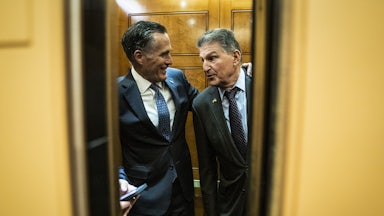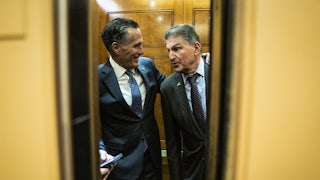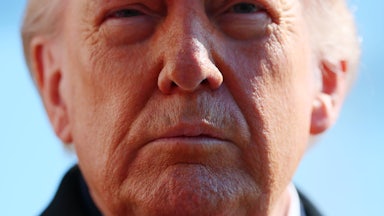Stop me if you’ve heard this one before: With weeks left in the year, Congress is rapidly running out of time to fund the government, and seemingly at a stalemate in negotiations for a spending package. But while avoiding a shutdown might be the greatest obstacle to clear this holiday season, it is not the only challenging box in the advent calendar of legislative priorities.
Lawmakers are hoping to reach a deal to extend expiring tax breaks, which could be tucked into an omnibus package of bills funding the government. With this as leverage, some Democrats are hoping to reinstate the expanded child tax credit, a program that lifted millions of children out of poverty but which expired at the end of last year.
“We’re going to keep at it until the end of the year. That’s the deadline,” Representative Rosa DeLauro, the chair of the House Appropriations Committee, told me on Monday. DeLauro has fought for an expanded child tax credit for nearly two decades, and is keeping the issue on the front burner even as she works on omnibus negotiations: “Every day is a new day in which to make the case.”
Prospects for reviving the credit have been dim, thanks to opposition from congressional Republicans and Democratic Senator Joe Manchin. GOP Senator Mitt Romney has introduced his own child allowance plan, but an updated version of the proposal released in the spring included work requirements.
However, the possibility of a tax extender deal to be included in an omnibus package has resurrected Democratic hopes for implementing the credit—even as lawmakers are unsure on whether a government funding deal can even be reached. As of Tuesday, negotiations were still in progress, meaning that the future of the child tax credit is still a theoretical question.
“We can only do that if we have an omnibus, and sitting here today, I just can’t predict whether we’re going to get there or not. I choose to think that we will and I hope we will,” Senator Michael Bennet told me last week.
If there is room for a deal on tax credit extensions in an end-of-year omnibus, research and development tax credits may be a particularly powerful bargaining chip for Democrats. As a budget gimmick to reduce the cost of the $1.7 trillion Tax Cuts and Jobs Act of 2017, the law required businesses to amortize, or expense, their R&D investments over five or 15 years instead of deducting the full cost immediately. Functionally, this policy—which started in 2022—penalizes companies in the tax code for R&D investments in the United States. The business community has consistently urged Congress to restore companies’ ability to deduct their R&D expenses annually.
Several Democratic lawmakers have repeatedly insisted that they will not support any tax credits for businesses without also reinstating the expanded child tax credit. “Some have said, ‘Well, you’re giving an ultimatum.’ You bet,” DeLauro told me. “We’re not going with credits for the largest corporations, the biggest businesses, without an expanded child tax credit. And I support R&D, I think it’s valuable. I don’t have any problem with that. I say: ‘Can’t have one without the other.’”
Senator Sherrod Brown, another advocate for the credit in the Senate, bristled when a reporter noted that the cost of the child tax credit outstrips that of an R&D credit; the Committee for a Responsible Federal Budget estimates that restoring R&D expensing would cost roughly $155 billion over 10 years, while reinstating the American Rescue Plan expansion of the child tax credit would cost $1.2 trillion over a decade. “What, are rich people not getting enough tax breaks in this country? Is that the mismatch?” Brown asked sarcastically. (Research from the Columbia Center on Poverty and Social Policy suggests that the child tax credit would have an annual cost of about $100 billion, but total benefits of almost $1 trillion per year.)
Under the American Rescue Plan, the child tax credit amount increased and expanded to cover children aged 17 and under, and was disbursed on a monthly basis. (The credit had previously only been available to children aged 16 and under.) It also became available to households with parents with no income, meaning that the poorest children had access to the full credit for the first time since the child tax credit was first implemented in 1997. That provision making the credit fully refundable had a particularly dramatic effect on child poverty: In 2021, child poverty dropped by 46 percent, due in large part to the expanded child tax credit. More than three million children fell below the poverty line in the first month after the credit expired.
Democrats maintain, at least publicly, that they do not want to sacrifice any element of the credit as expanded by the American Rescue Plan; DeLauro said that she was “not going to negotiate against myself.”
“Why the hell should I change it?” DeLauro asked, pointing to the program’s effectiveness in cutting child poverty during the six months that it was operative.
Bennet said that he would push for the credit to be increased and disbursed on a monthly basis, as it was under the American Rescue Plan. But his greatest priority is ensuring that the full credit is available to the nation’s poorest children—that is, ensuring whatever future form the credit takes, it is fully refundable. “If I were able to get every single thing I wanted, I think that would be good for kids in America and good for America. But I know that’s not where we’re going to end up,” Bennet told me. “So my job is to make sure that we fight for full refundability.”
The Joint Committee on Taxation estimated that making the current child tax credit fully refundable would cost around $12 billion a year. If the credit drops from $2,000 to $1,000 in 2026—as it is currently set to do—but becomes fully refundable, it would cost around $3 billion per year. However, the lower amount of the credit may lift fewer children out of poverty.
Republicans are loath to increase social spending in the omnibus, arguing that Democrats had directed billions of dollars in nondefense spending in the American Rescue Plan and the Inflation Reduction Act which passed over the summer. “And how much spending was made in the Trump tax cuts?” countered Senator Patrick Leahy, the chair of the Senate Appropriations Committee, referring to the $1.7 trillion Tax Cuts and Jobs Act.
Senator Richard Shelby, ranking member of the Senate Appropriations Committee, told reporters that negotiators were still about $25 billion to $26 billion apart in their top-line numbers. Senate Minority Leader Mitch McConnell warned on Tuesday that Congress may need to pass a short-term spending bill “into early next year” if there is no agreement. If there is no omnibus bill, the path forward for the child tax credit becomes increasingly difficult.
“Until we resolve that threshold question, I don’t think we’re going to make a ton of progress on any of the specifics,” Bennet told me. “I would say we’re in a mode of trying to figure out whether there’s any chance at all getting this vehicle done.”










